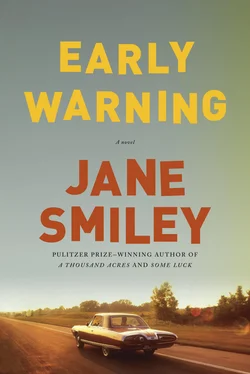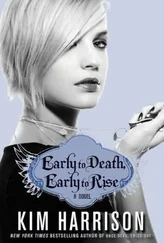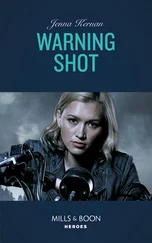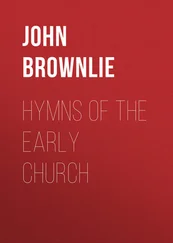Jane Smiley - Early Warning
Здесь есть возможность читать онлайн «Jane Smiley - Early Warning» весь текст электронной книги совершенно бесплатно (целиком полную версию без сокращений). В некоторых случаях можно слушать аудио, скачать через торрент в формате fb2 и присутствует краткое содержание. Год выпуска: 2015, Издательство: Knopf, Жанр: Современная проза, на английском языке. Описание произведения, (предисловие) а так же отзывы посетителей доступны на портале библиотеки ЛибКат.
- Название:Early Warning
- Автор:
- Издательство:Knopf
- Жанр:
- Год:2015
- ISBN:нет данных
- Рейтинг книги:5 / 5. Голосов: 1
-
Избранное:Добавить в избранное
- Отзывы:
-
Ваша оценка:
- 100
- 1
- 2
- 3
- 4
- 5
Early Warning: краткое содержание, описание и аннотация
Предлагаем к чтению аннотацию, описание, краткое содержание или предисловие (зависит от того, что написал сам автор книги «Early Warning»). Если вы не нашли необходимую информацию о книге — напишите в комментариях, мы постараемся отыскать её.
, a national best seller published to rave reviews from coast to coast.
Early Warning — читать онлайн бесплатно полную книгу (весь текст) целиком
Ниже представлен текст книги, разбитый по страницам. Система сохранения места последней прочитанной страницы, позволяет с удобством читать онлайн бесплатно книгу «Early Warning», без необходимости каждый раз заново искать на чём Вы остановились. Поставьте закладку, и сможете в любой момент перейти на страницу, на которой закончили чтение.
Интервал:
Закладка:
There was another long silence, and then Andy said, “Is there something I can do for her?” For me?
“I have a colleague,” said Dr. Grossman. “She might benefit from seeing him.”
But as she left the office, Andy thought, it was nature over nurture, wasn’t it? Ragnarök or nuclear exchange, what was the difference? How appropriate that the DEW Line (the “Distant Early Warning Line”—Andy mouthed the words) ran across Greenland, Iceland, and no doubt Norway. What was his name again — Loki — the one bound to the rocks with chains and ropes made of the entrails of his own son. Loki, the god of the moving earth, of crevasses opening up and caverns collapsing, was the one who had always frightened her, not Surt, the fiery one. When she was Janny’s age, any trembling, even of the branch her swing was anchored to, had put her in a fright. In the last ten years, she had considered and put away her fears — thermonuclear, fallout, Mutually Assured Destruction — one by one. Now they were back, and Janny seemed to sense them. The thing not to tell Janny was that there would be just two survivors, a couple named Líf and Lífþrasir, say Adam and Eve. But not Janny, not Richie, not Michael. Not Andy, not Frank.
—
FRANK DID NOT HAUNT Front Street and Maiden Lane; he circled it, wending here and there, his eye always peeled. He had the time — he’d given up the whoring and the flying and practically everything else. He told Andy that he had taken up golf, and was planning to join a country club but hadn’t decided which one, so he was visiting all of them. He even bought a set of clubs and kept them in the trunk of his Chrysler. But he didn’t drive the Chrysler any where near the Knickerbocker. He zipped over the GW Bridge, down the West Side Highway, then left on Canal Street. Then he parked in a lot near Chinatown, and started walking. Sometimes he walked first toward the river and then south (southwest — his inner compass was still accurate). Other times, he walked down Pearl Street or Gold Street, scanning the passing women.
He saw her twice in the first week in March. Both times, she was wearing the black coat. He followed her at a distance, taking note not only of where she went and which buildings she frequented, but also of whom she spoke to, whether any men walked along with her or picked her up (they did not), and whom she greeted. The first afternoon, he followed her for an hour and never got closer than half a block. The second time, she went into that same brick building after thirty-seven minutes. He needed a plan.
Events at the office interfered for a while. Friskie got drunk and slapped the Sulzberger cousin in the street outside the Waldorf after a dance — it got into the papers; the girl broke the engagement; Dave Courtland said high time, she was a Jew; and Frank had to fly down to Galveston and talk not only to Dave, but to the wife, Anna. It took seventeen days to work out a reconciliation, and the Sulzberger parents were not happy, but, on the other hand, they had not heard the “Jew” comment, and Friskie was a very, very handsome young man. Then the head of the Venezuela office, Jesús De La Garza, came for a visit, and he was in New York for seven days and out in Southampton for a long weekend. After he left, Jim Upjohn told Frank, he tacked a note to the door of the room Jesús stayed in that read, “Mine eyes have seen the glory of the going of the Lord.”
The gift was that Frank was sitting at a table in the White Horse Tavern, and he saw her through the window. She passed the outside tables, came in, sat down nearby, and pulled out a copy of The Atlantic Monthly. Her coat was a slender trench, two years out of style. When she pushed her scarf back, he saw she had short, thick hair now, dark with scattered gray streaks, but neatly cut. She was fuller in the bust than she’d been during the war, and had just the beginnings of a belly, though she was neatly girdled. As she read, two wrinkles formed between her eyebrows, and her mouth thinned a bit, though her lips were still fuller than most women’s. She ordered a sherry and kept reading. He squinted: it was an article entitled “Anyone Can Play the Harmonica.” This was true, in Frank’s experience, so he was surprised that there would be an article about it.
She must have sensed him looking over her shoulder, because she glanced in his direction and gave him one of those little smiles. He said, “Do I know you?”
“I don’t think so.” Her accent was very good, just an underlying melody of the Mediterranean.
Then he said, “May I know you?”
This time she laughed, and it was the same laugh he remembered, merry and deep, the laugh of a woman with plenty of experience.
“I come from a long line of harmonica players.”
“Is that possible?” said the woman.
Right then, Frank knew that his fate depended upon pretending that he had never met her before, to collude in the idea that he believed she was from Queens or Rome or wherever she wanted to be from. What people had done to survive the war was their own business, was it not? He smiled, knowing that his smile was still hypnotic if he really meant it. “My brother is a farmer in Iowa who makes harmonicas by hand, from roots and branches.”
She did laugh. She did.
They chatted for an hour, exchanging only names — hers was Lydia Forêt — but nothing about occupations or background. Button by button, she removed her coat. He took it from her and hung it on the coat rack. She was wearing a navy-blue sheath with a slender red belt. Frank took off his own jacket and loosened his tie. They discussed whether the humidity had gotten worse and the likelihood of a storm. Others were talking about Carol Burnett, who had won an Emmy the night before, so they did, too. “She’s funny,” said Frank. The woman said, “She’ll do anything. I like that.” Then she reddened a little and said, “For a laugh, I mean. I saw her do a show a few years ago somewhere around here, I think.” Frank said that he had seen Nichols and May on Broadway the previous year. The woman said that she had a ticket for My Fair Lady , and she was looking forward to seeing it. Frank said that he knew some people who had gone to the opening night of that. There was a pause in the conversation, and Frank said, “So — can anyone play the harmonica?”
“I guess this gentleman did.” She glanced at the page. “Herbert Kupferberg. In between watching Tannhäuser and Mozart, he taught himself to play ‘Taps.’ ” She glanced at her wristwatch and moved her feet. Frank stood up and fetched her coat. Then she stood, and he held it for her. He said, “I would like to talk with you again.”
She smiled. It was that same smile from eighteen years ago, sunny, retreating. She said, “Perhaps we shall run into each other.” She shook his hand, then turned and walked briskly through the White Horse Tavern door and click-click down Hudson Street. When she turned her head to look at something, Frank felt ravished and limp.
—
RUTH BAXTER’S CONSIDERED OPINION was that an autumn wedding was more unusual and therefore smarter than a June wedding or even a Christmas wedding, though you had more freedom with a Christmas wedding in choosing the colors of the bridesmaids’ dresses; but if, as Claire insisted, there were only going to be three bridal attendants (you could not say “bridesmaids,” because Lillian was not a “maid”), and four junior bridesmaids (Debbie, Janny, Tina, and Annie), then the color problem was easily solved — autumnal yellows and golds, with a touch of red here and there to go with autumn flowers (“Not the brightest of the year, but very classy,” said Ruth). Ruth’s own marital plans remained unclear, but Claire had become firmer in her identity as the future wife of Dr. Paul Darnell. For one thing, she had gotten fairly adept at her secretarial job, and it seemed silly for Paul to employ his current secretary when Claire could do the work for free; for another, she was almost twenty-four. Even if she got pregnant right away, she would be almost twenty-five when the baby was born, which meant that it might be rather difficult to regain her current figure afterward.
Читать дальшеИнтервал:
Закладка:
Похожие книги на «Early Warning»
Представляем Вашему вниманию похожие книги на «Early Warning» списком для выбора. Мы отобрали схожую по названию и смыслу литературу в надежде предоставить читателям больше вариантов отыскать новые, интересные, ещё непрочитанные произведения.
Обсуждение, отзывы о книге «Early Warning» и просто собственные мнения читателей. Оставьте ваши комментарии, напишите, что Вы думаете о произведении, его смысле или главных героях. Укажите что конкретно понравилось, а что нет, и почему Вы так считаете.











